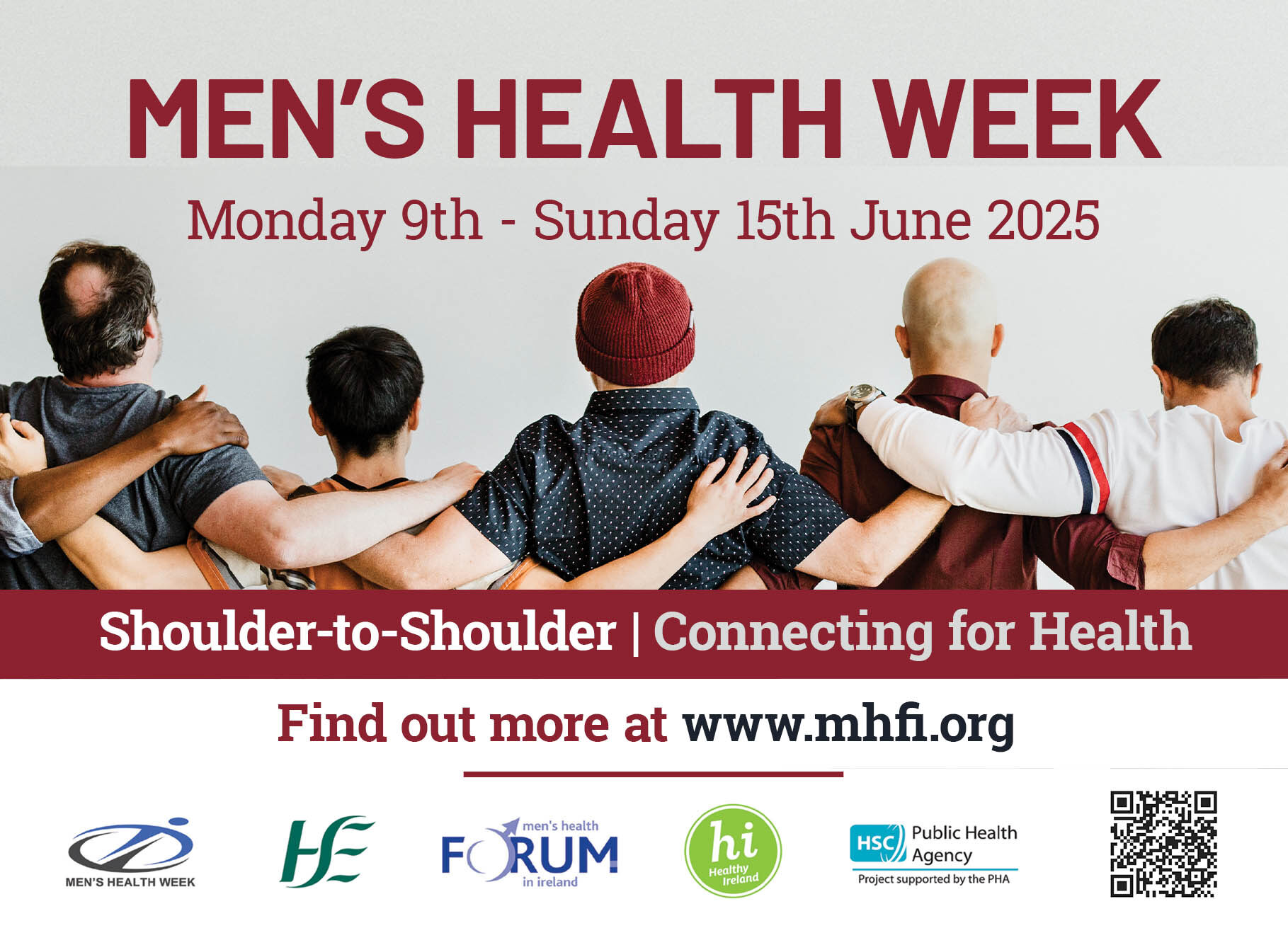Home » Ireland stands shoulder-to-shoulder for Men’s Health Week 2025
International Men’s Health Week will run from Monday 9 June until Sunday 15 June, and in this article, Colin Fowler, Director of Operations at Men’s Health Forum in Ireland, outlines the objectives of the 2025 event.

When males play sport together, or work on a communal task, we know what is meant by men standing ‘shoulder-to-shoulder’. They are unified, strong, resolute, focused, supportive and connected. They give 100 per cent and do the best job that they can. During Men’s Health Week 2025, everyone is being asked to put these positive traits into action, and to work together to support the health of men and boys on the island of Ireland.
Connecting for health is about policymakers ensuring that men have the resources to live long and healthy lives; service providers offering appropriate tools, advice and support to males; men taking small practical steps to improve their own health; and everyone looking out for, and after, each other.
During Men’s Health Week 2025, we are all being asked to set ourselves simple, realistic and practical tasks to make positive changes to the health of men and boys — and local pharmacies can play a key role in supporting this.
International Men’s Health Week (MHW) always begins on the Monday before Father’s Day and ends on Father’s Day itself. During 2025, it will run from Monday 9 until Sunday 15 June.
It is celebrated in many European countries, as well as in the USA, Australia, New Zealand, Canada and a number of other places worldwide. The overall aims are to:
It is coordinated locally by the Men’s Health Forum in Ireland (MHFI).
Not too long ago, we were unaware of the full extent of men’s poor health status and the specific health issues that they are contending with. However, this is no longer the case. In recent years, a broad range of research has highlighted the health challenges which face men in Ireland and further afield. Check out some of the key statistics in the Men’s Health in Numbers Report Card (available at mhfi.org).
This research shows that these men experience a disproportionate burden of ill-health and die too young:
Although the health of men in Ireland is poor, it is not a ‘lost cause’ — and it can be improved in many significant ways. A wide range of innovative and positive work has already taken place to support the health needs of men and boys: Ireland was the first country in the world to have a National Men’s Health Policy, which was succeeded by two dedicated Healthy Ireland Men (HI-M) Action Plans; men’s health training programmes have influenced how services and structures support males; pioneering approaches have been developed and tested which provide models for improving men’s health; new men’s health and support groups are evolving across the island of Ireland . . . Much has been achieved, but there is still plenty of room for improvement.
Of course, men, themselves, need to play a central role in taking control of their health and wellbeing. But men’s health is not just an issue for individual men. While it is crucial for men to take responsibility for looking after themselves, their health can often be determined by other factors outside of their personal control. Thus, there is also a need for policymakers, service providers, and society as a whole to recognise the role that they need to play, and to do something practical about it. This will require everyone to focus attention upon the men and boys around us. Local pharmacies across Ireland have a critical gatekeeper role to play in supporting these changes for the better.
“Pharmacy staff are also well positioned to open-up conversations with men about their health needs, explore possible options and, if necessary, suggest that they may need to seek further expert assistance.”

In Ireland, there is often a disconnection between medical services and local people. This is even more pronounced for men, and it is well documented that some men are not, necessarily, good at coming forward early enough to have their health issues dealt with in a timely way.
At the same time, there is a strong body of evidence which shows that pharmacies can play a critical role in being the first point of contact for promoting and improving the health of men and boys. Indeed, findings from research (mhfi.org/menandpharmacies.pdf) highlight that:
Pharmacies can, therefore, offer an on-street showcase for information, which may increase awareness of the health issues facing men and boys. Indeed, pharmacy staff are also well positioned to open-up conversations with men about their health needs, explore possible options and, if necessary, suggest that they may need to seek further expert assistance. As such, they play a crucial sign-poster role, which has often been under-valued in medical circles.
But this is not one-way traffic . . . building relationships with men, and getting them to use local pharmacies more regularly, is also a sound business strategy!
Every pharmacy in Ireland can do something to mark MHW 2025 — the only limitation is imagination. For example, you could put up some posters; create a men’s health window display; give out copies of the free Action Man — ten top tips for men’s health booklet; leave a batch of the Do You Know Your Numbers z-cards on your counter; post about the week on social media; team-up with a community group and support a local men’s health event or activity; and/or offer some basic health checks to men in your area. Doing even one of these simple suggestions will contribute hugely to improving the health of local men and boys.
You can find out everything that you need to know about the week, including how to get free hard copies of the resources, at mhfi.org > MHW.
Colin Fowler

Director of Operations, Men’s Health Forum in Ireland (MHFI)
Highlighted Articles